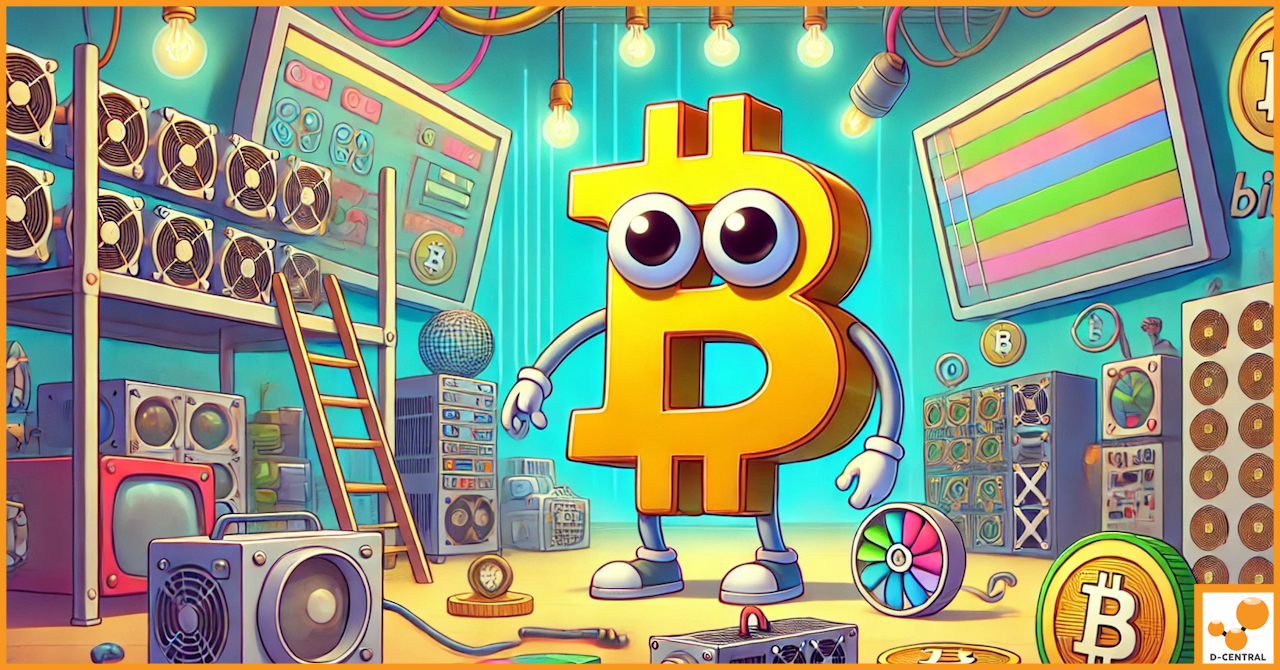
Repurposing Old Hardware for Bitcoin Mining: Is It Worth It?
As Bitcoin continues to captivate investors and tech enthusiasts alike, you might be wondering about innovative ways to join the
4479 Desserte Nord Autoroute 440, Laval, QC H7P 6E2

In a world where financial systems often feel like they’re designed to keep us in a state of perpetual servitude, the concept of “The Matrix” resonates deeply, especially within the Bitcoin community. This iconic sci-fi film serves as a metaphorical lens through which we can examine our own financial realities, questioning the very systems we’ve grown accustomed to. It’s no wonder that the themes of “The Matrix” have found a unique echo among Bitcoin enthusiasts, who advocate for financial freedom and autonomy.
This article is inspired by a thought-provoking tweet thread by @utxo_one, who delves into the uncanny parallels between the world of “The Matrix” and the ethos of Bitcoin. From the illusion of financial security to the reality of financial servitude, the thread serves as a compelling narrative that many in the Bitcoin community can relate to.
So, if you’re intrigued by the intersection of Bitcoin and “The Matrix,” and are looking to unplug from the cycle of financial servitude, you’ve come to the right place.
Have you ever had the nagging feeling that something is fundamentally wrong with the way our financial system operates? It’s a sentiment that many share but find hard to articulate—a sort of intuitive understanding that we’re part of a system designed more for its self-preservation than our financial well-being. This feeling is what Morpheus in “The Matrix” refers to as the “splinter in your mind,” a persistent itch that drives you to question the very fabric of the world you live in.
In “The Matrix,” this splinter leads the protagonist, Neo, to seek the truth, ultimately revealing the simulated reality he’s been living in. Similarly, the flaws in our financial system—ranging from inflation to the centralization of financial power—act as that splinter for many, driving them to seek alternatives. It’s this intuitive understanding that something is amiss that has led many to explore Bitcoin. Unlike traditional currencies controlled by centralized entities, Bitcoin offers a decentralized alternative that promises greater financial autonomy and freedom.
So, what is it about our current financial system that makes it feel so flawed? For one, the constant money printing and subsequent inflation devalue our savings, making the future uncertain. Additionally, the centralization of financial power in the hands of a few institutions creates a system of inequality, where the rich get richer at the expense of the average person. These financial system flaws are what make that “splinter in your mind” itch more persistently, pushing you to seek alternatives like Bitcoin that offer a way out of this financial quagmire.
In a world where centralized control of money is the norm, we often find ourselves trapped in a web of distorted economic incentives. Just as the Matrix in the film manipulates its inhabitants into a state of subdued compliance, our financial system, too, exerts a form of control that shapes our behavior in ways that are not always in our best interest.
Centralized control of money has led to a myriad of issues that affect the average person’s financial health. For instance, the ability of central banks to print money at will has resulted in inflation, diminishing the purchasing power of your hard-earned savings. This creates an economic incentive to spend rather than save, as the value of money decreases over time. Similarly, centralized financial institutions often offer low-interest rates on savings accounts while charging exorbitant fees, further discouraging the practice of saving.
In “The Matrix,” the control exerted by the simulated reality is all-encompassing, dictating the actions and even thoughts of its inhabitants. While our financial system may not be as overtly dystopian, the centralized control it wields shapes our economic behavior in subtle ways. It creates a cycle of debt and consumption, discouraging long-term financial planning and independence. Just as the Matrix seeks to keep its inhabitants in a perpetual state of ignorance and servitude, our financial system, too, benefits from a populace that is financially dependent and uninformed.
The parallels between Matrix control and the centralized control of our financial system are striking. Both serve to perpetuate a system that benefits the few at the expense of the many, creating perverse economic incentives that keep us trapped in a cycle of financial servitude.
One of the most unsettling aspects of “The Matrix” is the way it harvests human energy, using people as mere batteries to fuel its own existence. While this may seem like a far-fetched dystopian concept, it bears an uncomfortable resemblance to how our current economic systems operate. Through mechanisms like taxes and inflation, these systems effectively “harvest” our financial energy, leaving many in a state of perpetual struggle.
Taxes, while necessary for the functioning of a society, have often been structured in a way that disproportionately affects the middle and lower-income brackets. The wealthy, with their armies of accountants and tax loopholes, manage to evade a significant portion of their tax obligations, shifting the burden onto the average citizen. This form of financial exploitation siphons off a considerable amount of human energy, as people work hard only to see a substantial part of their earnings go to taxes.
Inflation adds another layer of financial burden. The constant printing of money by central banks erodes the value of our savings, forcing us to work harder and longer to maintain our standard of living. This is akin to the Matrix’s harvesting of human energy, where individuals are drained to sustain a system that they have no control over.
In both scenarios—whether it’s the Matrix or our financial system—the end result is the same: the exploitation of human energy to fuel a system designed for the benefit of a select few. While the Matrix uses humans as batteries, our economic systems use us as cogs in a machine of financial exploitation, draining us through taxes and inflation.
When we talk about the forces that keep us in a state of financial servitude, it’s easy to imagine a shadowy group of individuals pulling the strings behind the scenes. However, the reality is far more complex and less personified. The “they” we often refer to is not a cabal of nefarious actors but rather a system—a system built on perverse incentives that keep the majority in a cycle of financial dependency and struggle.
This system of perverse incentives manifests in various ways, from the central banks that control monetary policy to the financial institutions that dictate the terms of our loans and savings. These entities are part of an economic structure designed to maintain the status quo, a structure that benefits from keeping the populace financially illiterate and dependent.
In “The Matrix,” the concept of “they” is embodied by the machines that have enslaved humanity, but it’s crucial to understand that these machines are part of a larger system. Similarly, when we talk about the forces that keep us in financial servitude, we’re talking about an economic structure that thrives on inequality and exploitation. It’s a system that rewards short-term gains over long-term sustainability, consumption over saving, and debt over financial freedom.
The insidious nature of this system is that it’s self-perpetuating. The more financially dependent people are, the more power the system gains, creating a feedback loop that’s difficult to break. This is why financial education and empowerment are so crucial—they offer a way to break the cycle and escape the financial servitude that this system imposes on us.
In “The Matrix,” the simulated world serves as a veil that blinds its inhabitants to the harsh realities of their existence. This illusion of reality is a powerful metaphor for the financial systems that govern our lives, systems that often obscure economic truths under layers of complexity and misinformation. Just as the Matrix distracts its inhabitants with a simulated life, our financial systems create an illusion of stability and prosperity, masking the underlying economic realities that affect us all.
For many, the belief that working a 9-to-5 job and saving in a traditional bank account will lead to financial security is a deeply ingrained notion. However, this is often a mirage. The reality is that inflation erodes the value of savings over time, and the centralized control of financial institutions can lead to economic crises, as witnessed in events like the 2008 financial meltdown. These financial systems are designed to keep us in a state of complacency, unaware of the economic realities that could jeopardize our financial future.
The Matrix serves as a compelling metaphor for this illusion. In the film, breaking free from the Matrix involves acknowledging the uncomfortable truths about one’s existence and taking the red pill to see the real world. Similarly, breaking free from the illusions created by our financial systems involves educating ourselves about these economic realities. It requires us to question the norms and practices we’ve been conditioned to accept and seek alternatives that offer true financial freedom.
The term “funny money” often refers to a financial system where the value of currency is not backed by any tangible assets but is instead determined by the policies of central banks and financial institutions. While this might seem like a functional system on the surface, it’s a recipe for economic instability. Just as a building with a shaky foundation is prone to collapse, an economy built on “funny money” is susceptible to a range of financial crises.
One of the most glaring consequences of this system is inflation. When money can be printed at will, its value inevitably decreases, leading to rising prices for goods and services. This form of economic instability affects everyone but hits the lower and middle classes the hardest, as their purchasing power diminishes over time.
Moreover, an economy built on “funny money” encourages irrational behavior. When saving money in a bank yields little to no interest and is subject to the erosive effects of inflation, people are incentivized to take greater financial risks. This leads to speculative bubbles, reckless investments, and a general sense of financial imprudence. It’s a system that rewards short-term gains and punishes long-term planning, creating a volatile economic landscape rife with uncertainty.
In a world where negative interest rates are becoming increasingly common, the traditional financial system seems to be turning the very concept of saving on its head. Negative interest rates essentially penalize savers, making it costly to keep money in a bank account. This bizarre economic scenario pushes people to seek alternatives, encouraging them to opt out of the traditional financial system altogether.
Much like Neo’s decision to exit the Matrix, the advent of negative interest rates serves as a catalyst for individuals to question the reality of their financial circumstances. When the system you’ve trusted to safeguard your financial well-being starts to erode it instead, the rational choice is to look for an exit. Negative interest rates expose the absurdity of the current financial landscape, making it increasingly difficult for people to ignore the cracks in the system.
In “The Matrix,” Neo chooses to take the red pill, opting out of the simulated reality to face the harsh truths of the real world. Similarly, negative interest rates are pushing more people to opt out of a financial system that no longer serves their interests. It’s a wake-up call, signaling that it’s time to seek alternatives that offer genuine financial security and freedom.
In this exploration of the uncanny parallels between “The Matrix” and our current financial systems, we’ve touched on a range of issues—from the intuitive understanding that something is fundamentally wrong, to the perverse incentives that keep us in financial servitude. We’ve discussed the illusion of reality created by these systems, the economic instability stemming from “funny money,” and the irrational behaviors that such a system encourages. Finally, we looked at how negative interest rates are pushing people to opt out, much like Neo chose to exit the Matrix.
All these points converge to highlight the ethos of Bitcoin—a decentralized, transparent, and empowering alternative to the traditional financial systems that have failed us. Bitcoin offers a way to unplug from the financial Matrix, providing a path to financial freedom and autonomy.
If you’ve felt that “splinter in your mind,” if you’re tired of the financial exploitation and are looking for a way to reclaim your financial independence, then it’s time to explore Bitcoin. Take the red pill of financial freedom and unplug from a system that’s designed to keep you in servitude. Your journey to financial liberation starts here.
Full credit goes to @utxo_one for the original tweet thread that inspired this article.
How does “The Matrix” serve as a metaphor for our current financial realities?
“The Matrix” serves as a metaphorical lens to examine our current financial realities. It depicts a world of illusion, control, and exploitation that mirrors the way our financial systems operate. These systems often obscure economic truths under layers of complexity and misinformation, much like the Matrix distracts its inhabitants with a simulated life.
What is the “splinter in your mind” in the context of our financial system?
The “splinter in your mind” is a metaphor used to describe the nagging feeling that something is fundamentally wrong with the way our financial system operates. It’s a sentiment shared by many that drives them to seek alternatives such as Bitcoin, a decentralized currency that offers more financial autonomy and freedom.
How does Bitcoin offer a way to unplug from the financial Matrix?
Bitcoin offers a way to unplug from the financial Matrix by providing a decentralized, transparent, and empowering alternative to traditional financial systems. Unlike traditional currencies controlled by centralized entities, Bitcoin allows for greater individual financial autonomy and freedom.
What is the problem with our current financial system?
Our current financial system has several flaws that contribute to financial inequality and instability. These include the centralization of financial power, constant money printing and subsequent inflation, and perverse economic incentives that discourage savings and encourage reckless investment.
What is meant by “funny money” and what are its consequences?
“Funny money” refers to a financial system where the value of money is not backed by any tangible assets but is instead determined by the policies of central banks and financial institutions. The consequences of this system include inflation, economic instability, irrational financial behavior, and a general sense of financial insecurity.
How do negative interest rates factor into the dissatisfaction with the current financial system?
Negative interest rates exacerbate dissatisfaction with the current financial system because they essentially penalize savers. This discourages saving and pushes people to seek alternatives, thereby making them more likely to opt out of the traditional financial system altogether.
DISCLAIMER: D-Central Technologies and its associated content, including this blog, do not serve as financial advisors or official investment advisors. The insights and opinions shared here or by any guests featured in our content are provided purely for informational and educational purposes. Such communications should not be interpreted as financial, investment, legal, tax, or any form of specific advice. We are committed to advancing the knowledge and understanding of Bitcoin and its potential impact on society. However, we urge our community to proceed with caution and informed judgment in all related endeavors.
Related Posts

As Bitcoin continues to captivate investors and tech enthusiasts alike, you might be wondering about innovative ways to join the

In the rapidly evolving world of cryptocurrency, securing digital assets has become paramount for both novice and seasoned investors alike.

In the cryptocurrency world, mining is an essential process that helps create new coins and verify transactions on the network.